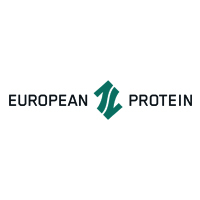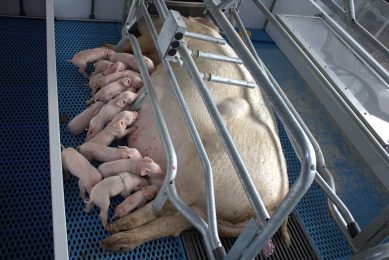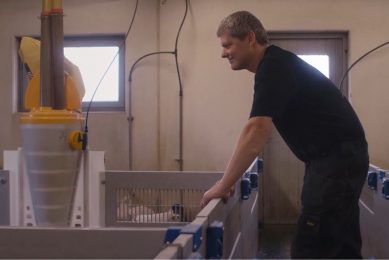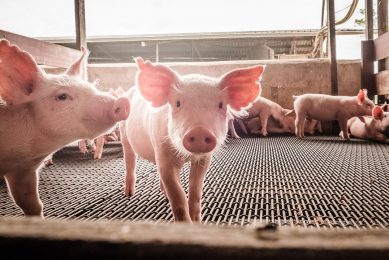Healthy sows wean more piglets
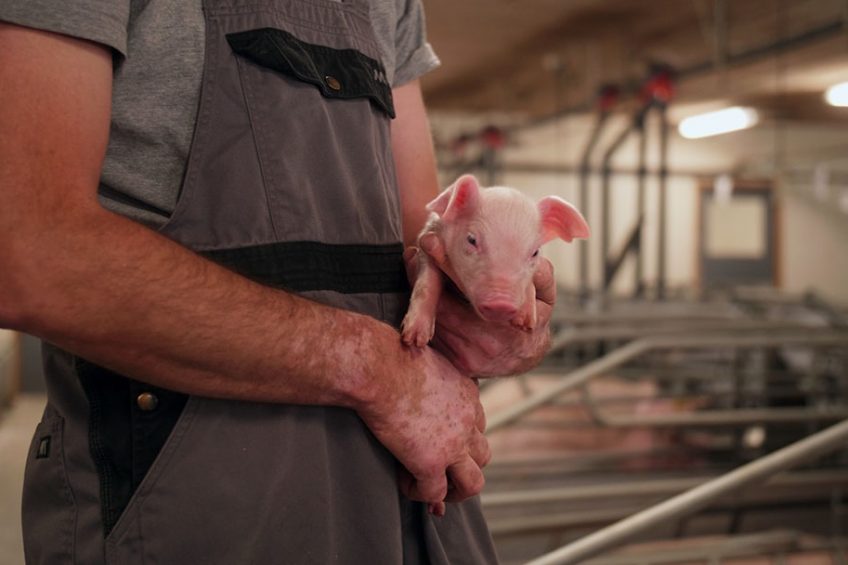
A recently published trial on sow nutrition demonstrates that dry fermented proteins have a considerable impact on the total performance of the sow and piglets. By adding complementary fermented rapeseed protein to the sows feed both litter size and piglet mortality is improved.
The trial was conducted by Lublin University, Poland, to test the hypothesis that fermented rapeseed improves digestibility in sows and reduces ANF‘s. Furthermore, the prebiotic fibre and the probiotics in the product modulates the gut with beneficial bacteria. Finally, the anti-inflammatory and anti-microbial metabolites present in the fermented rapeseed protein thickens the gut mucosa and enforces immune functions. As a result, pig health and performance improve.
About the trial
The feeding regimes were divided into 4 groups of 15 sows each (Table 1). 2 of the 4 groups were gilts. The remaining 2 consisted of 3rd or higher lactation sows. One gilt and one sow group were fed with either a fermented rapeseed meal or a standard diet with soybean meal. The fermented rapeseed meal replaced soybean meal and added acidifiers in the standard diet, keeping all nutrients at the same level.
Both gilt and sow performance benefitted from fermented rapeseed protein, but the effect was more pronounced in gilts. Sows and gilts fed with fermented rapeseed digested protein, fat and fibre better than the sows and gilts fed the control diet. A significantly lower amount of phytic- phosphorous was found as compared to the control diet.
Balanced and more diverse gut bacteria
Fermented rapeseed meal improves the relationship between pathogenic and beneficial bacteria in the gut. In the faeces of gilts and sows the number of E. Coli, Clostridium Perfringens and Fungi were reduced, especially when fed with 9% fermented rapeseed meal. This improved microbiome is passed on from sow to the piglet.
The trial results showed that gilts and sows in the rapeseed diet had respectively 40% and 25% more antibodies in their milk compared to the control. Piglets from the fermented rapeseed protein diet received more antibodies, and therefore had a better and more resilient immune system compared with the piglets from sows on the control diet.
Less diarrhoea, higher litter weight
Piglets from the experimental group had significantly fewer incidences of diarrhoea. At the same time, the severity of the diarrhoea reduced. Piglet mortality decreased from 21% to 9% in gilts and was tendentially lower for sows at 5% instead of 6% in the older sows’ litter.
After 28 days gilts fed with fermented rapeseed protein weaned on average more than 2 piglets extra and sows weaned more than 1.5 piglets extra compared to the control diet. This meant that the litter weight increased all together.
Balanced gut bacteria composition
The trial results showed that gilts and sows eating fermented rapeseed meal used their feed more efficiently and therefore produce more and better milk. They had a balanced gut bacteria composition with less of the troublesome pathogens present and inoculated their piglets with a better microbiome.
The piglets born without an active immune system, were better protected against due to a higher level of IgG and IgA in their mothers’ milk. These piglets had fewer incidents and less severe diarrhoea during lactation. A lower number of piglets from the experimental groups died and the total number of piglets and litter weight was increased at weaning compared to the control group. Want to see the data behind the trial? Visit the European Protein the website.
Functional protein already on the market
The product used in the trial is produced by European Protein, who produces functional fermented proteins in Denmark, Ukraine and the USA. The data from the trial is consistent with the practical results European Protein have documented in commercial farms.
The products support a positive gut modulation resulting in more and better milk for the piglets. The antibacterial and anti-inflammatory effects have furthermore been improved in the product EP199 to focus on reducing the gram-positive pathogenic bacteria passed on from sow to piglet. More information can be found here.


